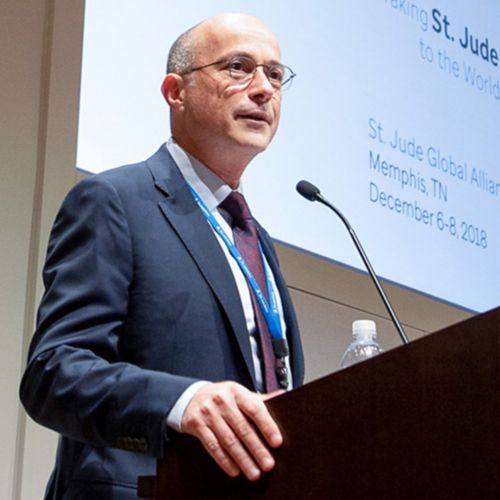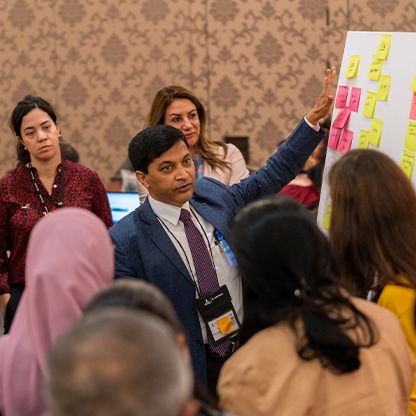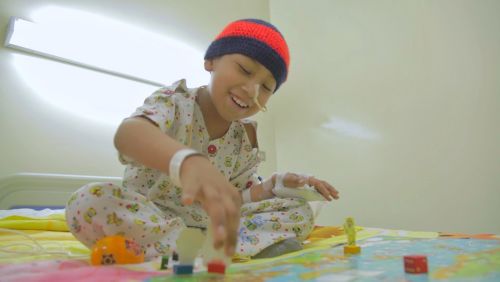St. Jude Family of Websites
Explore our cutting edge research, world-class patient care, career opportunities and more.
St. Jude Children's Research Hospital Home

- Fundraising
St. Jude Family of Websites
Explore our cutting edge research, world-class patient care, career opportunities and more.
St. Jude Children's Research Hospital Home

- Fundraising
Global Scholars: Yusuf Danasabe Jobbi
Other Global Scholars Projects:
Jobbi uses genomics to improve sickle cell disease outcomes
Fighting sickle cell disease has always been a very personal battle for Yusuf Danasabe Jobbi.
He has lost loved ones to the disease. He has seen family members suffer, physically and psychologically. And he has seen the impact that sickle cell disease has had on his native Nigeria, where there are more cases than anywhere else in the world.
“A lot of personal experiences of unnecessary suffering related to sickle cell disease ignited my interest in the field of health,” Jobbi wrote in a personal journey statement for St. Jude. “I found myself growing curious and wondering what could have been done differently to improve the high rate of child mortality and morbidity as a result of this disease.”
Now, that pursuit has led Jobbi to tackle the disease and its complications from a new angle: genomics.

“Most of the time, people don’t look at things in this way. And this is the right answer; this is the right thing to do. Because … to tackle any genetic disease, you have to go to the genomes to understand it better.” — Yusuf Danasabe Jobbi
Specifically, the medical laboratory scientist has dedicated his Scholars Project to examining the diversity and variants of two genes — the HBB gene on chromosome 11 and the Mannose Binding Lectin 2 (MBL2) gene on chromosome 10. These genes, respectively, relate to the development of sickle cell disease and to a patient’s ability to fight infections, which can be a particular concern in low- and middle-income countries.
“My biggest aim is to find out ways to improve the diagnosis, management, and treatment of sickle cell disease, using genomic biomarkers and their related variants,” Jobbi says. He notes that this is a new approach for a part of the world that has tended instead to analyze biomaterials like blood, urine, and feces.
“Most of the time, people don’t look at things in this way. And this is the right answer; this is the right thing to do. Because … to tackle any genetic disease, you have to go to the genomes to understand it better.”
Mutations in the HBB gene cause sickle cell disease, an inherited blood disorder. The MBL2 gene helps the body produce a protein complex known as mannose-binding lectin, which is a key part of the immune system’s response to pathogens.
By examining these two genes together, Jobbi is hoping to identify and understand predictors of bacteremia among children with sickle cell disease in his hometown of Kano, Nigeria. He has seen cases where families and their children would seem to do everything right but still fall victim to deadly infections. “[The child] might receive all his vaccinations. He can receive all his prophylactics. But because the gene is affected, there are a lot of complications.”
His project seeks to correlate these patient outcomes with genomic patterns.
“Don’t forget we are from a low- and middle-income country,” he says. “Nigeria has the highest volume of this sickle cell disease. … And let’s say literature says 80, some say 70, 60% of deaths come from these infections — bacteremia. … So, most of the kind of problems that result is just because of these infections.”
The project marks a new front in an ongoing battle for Jobbi.
“A lot of children [with sickle cell disease] are falling into serious problems,” he says. Seeing this in his community and his own family, he was inspired to study medical laboratory science, with a specialization in hematology. He then attended an internship at a state teaching hospital, where he began to see that “what was taught in school is entirely different from what is outside the school.”
This experience spurred Jobbi to join outreach programs for sickle cell awareness. He dove into research — both on sickle cell disease and on other infectious diseases. Soon, his focus turned to genomics, an interest that led him to earn a master’s in biotechnology, to attend programs in Dubai and Ghana, and eventually, to collaborate on sickle cell research with St. Jude.
He joined the second cohort of students in the MSc-GCH program at the St. Jude Children’s Research Hospital Graduate School of Biomedical Sciences. And after graduating in 2022, he is now working to bring his Scholars Project to life.
“This is where the world is going,” he says of the genomics approach. “We evaluate patients based on their blueprints [DNA]. This is a hereditary disease; this is a genomic disease. So just relying on some other things that are in blood and urine and feces will not give you a better picture.”
To paint a picture of how the project itself will play out, Jobbi pulls up an online Miro board, on which he’s laid out concepts and considerations, key steps and key personnel.
“This is a dream that I’ve been nurturing,” he says, before walking through how he’s modeled his approach and execution.
The Miro board shows steps for gaining ethical clearance, recruiting patients, collecting samples, analyzing the samples, and then shipping them to St. Jude for sequencing. He aims also to catalog his results in the St. Jude Cloud for future scientific analysis.
Along the way, he’s drawing on the skills he took away from the master’s program: Managerial skills. Strategy skills. Leadership skills.
“The first year, they’ll provide the foundational knowledge to you, which is the biostatistics, the epidemiology, and then the foundation of Global Child Health. Then, the second semester, they will take you into health systems, other things that have to do with health economics, and other things that have to do with strategy studies, innovations, organization leadership.
“So, you see, these are things that I needed [in order to] come up with my dream and actualize it as a scientist.”
The word “dream” is one that Jobbi uses often. And there is an infectious enthusiasm in his voice as he talks about his project, about taking this next step in a very personal fight.
“It’s just like magic sometimes when I look at these things,” he says.
“It’s everything to me.”


